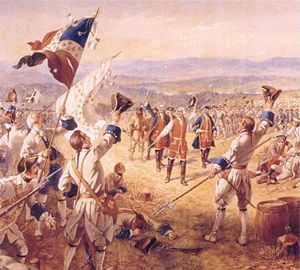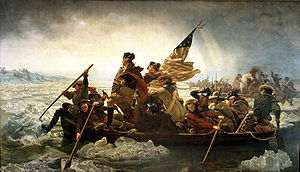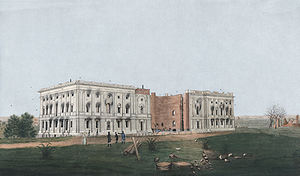| |
Date |
Event(s) |
| 1 | 1740 | - 1740—1748: King George's War
King George's War is the name given to the military operations in North America that formed part of the War of the Austrian Succession (1740–1748). It was the third of the four French and Indian Wars. It took place primarily in the British provinces of New York, Massachusetts Bay (which included Maine as well as Massachusetts at the time), New Hampshire (which included Vermont at the time), and Nova Scotia. Its most significant action was an expedition organized by Massachusetts Governor William Shirley that besieged and ultimately captured the French fortress of Louisbourg, on Cape Breton Island in Nova Scotia, in 1745
|
| 2 | 1745 | - 12 May 1745—28 Jun 1745: Siege of Louisbourg
The siege of Louisbourg took place in 1745 when a New England colonial force aided by a British fleet captured Louisbourg, the capital of the French province of Île-Royale (present-day Cape Breton Island) during the War of the Austrian Succession, known as King George's War in the British colonies.
|
| 3 | 1754 | - 1754—10 Feb 1763: The French and Indian War
 The French and Indian WarThe French and Indian War was a theater of the Seven Years' War, which pitted the North American colonies of the British Empire against those of the French, each side being supported by various Native American tribes. The French and Indian WarThe French and Indian War was a theater of the Seven Years' War, which pitted the North American colonies of the British Empire against those of the French, each side being supported by various Native American tribes.
|
| 4 | 1755 | - 1755—1764: Acadian Expulsion
The Expulsion of the Acadians was the forced removal, by the British, of inhabitants of parts of a Canadian-American region historically known as Acadia, between 1755 and 1764. The area included the present-day Canadian Maritime provinces of Nova Scotia, New Brunswick, and Prince Edward Island, and the present-day U.S. state of Maine. The Expulsion, which caused the deaths of thousands of people, occurred during the French and Indian War (the North American theatre of the Seven Years' War) and was part of the British military campaign against New France.
|
| 5 | 1770 | - 5 Mar 1770: Boston Massacre
The Boston Massacre was a confrontation in Boston on March 5, 1770, in which nine British soldiers shot several of a crowd of three or four hundred who were harassing them verbally and throwing various projectiles. The event was heavily publicized as "a massacre" by leading Patriots such as Paul Revere and Samuel Adams.
|
| 6 | 1775 | - 18 Apr 1775—14 Jan 1784: American Revolutionary War
 American Revolutionary War American Revolutionary War
- 19 Apr 1775: Battles of Lexington and Concord
The Battles of Lexington and Concord were some of the leading military engagements of the American Revolutionary War. The battles were fought on April 19, 1775, in Middlesex County, Province of Massachusetts Bay, within the towns of Lexington, Concord, Lincoln, Menotomy (present-day Arlington), and Cambridge. They marked the outbreak of armed conflict between the Kingdom of Great Britain and Patriot militias from America's thirteen colonies.
- 10 May 1775: Americans capture Fort Ticonderoga in NY
The capture of Fort Ticonderoga occurred during the American Revolutionary War on May 10, 1775, when a small force of Green Mountain Boys led by Ethan Allen and Colonel Benedict Arnold surprised and captured the fort's small British garrison.
|
| 7 | 1785 | |
| 8 | 1786 | - 1786—1787: Shays' Rebellion
Shays' Rebellion was an armed uprising in Western Massachusetts and Worcester in response to a debt crisis among the citizenry and in opposition to the state government's increased efforts to collect taxes on both individuals and their trades. The fighting took place in the areas around Springfield during 1786 and 1787.
|
| 9 | 1789 | |
| 10 | 1797 | |
| 11 | 1798 | |
| 12 | 1801 | |
| 13 | 1809 | |
| 14 | 1812 | - 12 Jun 1812—16 Feb 1815: War of 1812
 War of 1812
The War of 1812 was fought by the United States and its indigenous allies against the United Kingdom and its own indigenous allies in British North America, with limited participation by Spain in Florida. It began when the United States declared war on 18 June 1812. Although peace terms were agreed upon in the December 1814 Treaty of Ghent, the war did not officially end until the peace treaty was ratified by the United States Congress on 17 February 1815. War of 1812
The War of 1812 was fought by the United States and its indigenous allies against the United Kingdom and its own indigenous allies in British North America, with limited participation by Spain in Florida. It began when the United States declared war on 18 June 1812. Although peace terms were agreed upon in the December 1814 Treaty of Ghent, the war did not officially end until the peace treaty was ratified by the United States Congress on 17 February 1815.
|
| 15 | 1815 | |
| 16 | 1817 | |